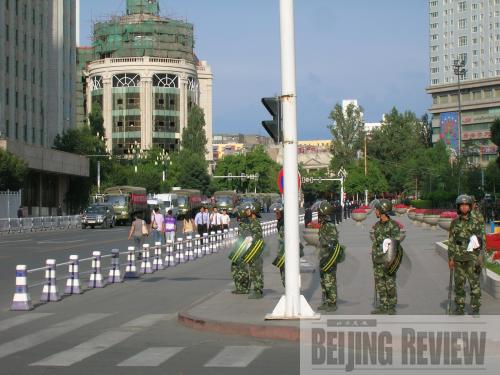|
 |
|
CITY ON GUARD: People walk on Dongfeng Road next to Urumqi's central People's Square on July 7. The square was lined with People's Armed Police officers guarding to prevent more violence (LI LI) |
The storm of lootings, killings and arson on the evening of July 5 that raised tensions on the streets of Urumqi, capital city of Xinjiang Uygur Autonomous Region, began to ease on July 8.
Local police halted city traffic on July 7 by setting up barricades across the city to prevent new violence. The same day, separate incidents were reported in different parts of the city. Party head of the autonomous region Wang Lequan demanded during a July 7 televised speech that crowds on the street remain calm and refrain from using violence.
Traffic had mainly gone back to normal on the morning of July 8, as bus service resumed and many stores and restaurants reopened for business. Fruit vendors were back on city streets selling apricots and plums.
"The incident several days ago was instigated by a few criminals," repeated loudspeakers mounted to People's Armed Police (PAP) trucks that were traveling around the city. "It is neither a religious conflict, nor a conflict between people of different ethnic groups. Xinjiang belongs to the people of all ethnic groups. Please calm down and go back home."
Barricades guarded by PAP soldiers were still seen around the city to counter new attacks by gatherings of people. Many stood on the streets to observe the latest developments.
"Yesterday I was too afraid to walk out of my home. But today the situation is much better," said resident Wei Xinhai, who was standing beside a car store that was set ablaze on July 5. Dozens of new cars were destroyed in the fire. Wei, whose family lives two blocks from the store, said he saw plumes of smoke coming from the location on his way home from work that evening. He said he had never seen such a catastrophic scene since moving to Xinjiang 25 years ago.
"These people are too brutal," he said, pointing to the blackened building. Standing less than 20 meters from a group of policemen, Wei said he felt quite safe. His wife took the bus to work.
Liu Jianrong, a local resident working for a website company based in Urumqi, believed that restoring order would take a week. Liu, a former journalist, reported on a riot of Uygur people in the northwestern Xinjiang city of Ili in 1993. He said the riot would harm relations between ethnic groups.
"When there is a terrorist attack, everyone blames the terrorists, who are a specific group of people and seem to be far away from residents' daily lives. But a riot like the recent one could sour community relations between different ethnic groups who live next to each other," he said. On July 7, Liu gave several Uygur colleagues a lift home because they worried about retaliative attacks from Han residents.
Urumqi has a population of 2.1 million, said a government website. The Han ethnic group, the area's biggest, comprises 75 percent of the city's total population. Uygurs are the city's largest minority ethnic group. Homes and shops of different ethnic groups are mixed together throughout the city.
Some residents worried about the unrest's impact on their income. A young taxi driver who asked to remain anonymous said it is a shame that the incident would greatly undermine people's sense of safety in this city. As a nightlife enthusiast, he said he used to leave the night markets for home at 2 a.m. and still feel perfectly safe walking alone through the streets. Now he cannot imagine when people will feel the same level of safety again. The driver also worried about his income during this year's tourism season in Xinjiang, which typically lasts from July to October.
"I had a busier-than-usual day today since many people who usually take buses to work preferred to take taxis for safety. But due to the riots, many tourists from other parts of China might cancel their travel plans to Xinjiang this year. It would definitely affect my income," he said.
(Reporting from Urumqi, Xinjiang) | 